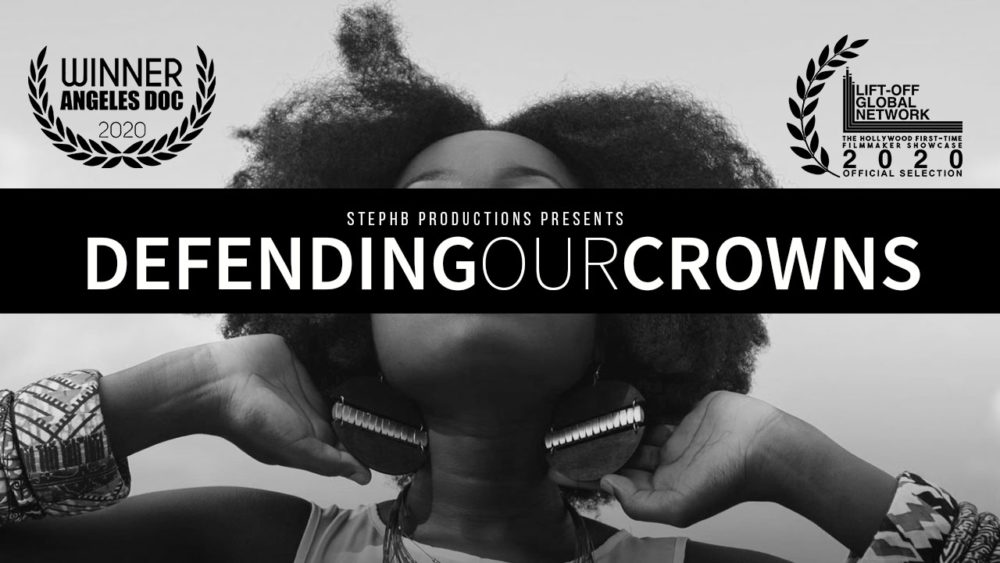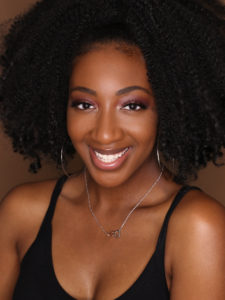
The Capstone is a daunting final graduation requirement for Bellarmine College of Liberal Arts Journalism students. Formats vary from a paper, to a long form article, to multimedia compositions. Ideally, the project exhibits the expertise a graduating journalism student has acquired over his/her four years at Loyola Marymount University. Stephanie Bell’s Capstone documentary, Defending Our Crowns, is a shining example of how graduates can parlay their academic achievements into professional success. The film examines how Black women in entertainment experience discrimination as a result of the studios’ failure to hire hair professionals who can style Black hair. After Defending Our Crowns won the award for best student documentary at the Angeles Film Festival, BCLA sat down with Stephanie to interview her about the film, its success, and her future plans. You can watch Defending our Crowns at www.stephbproductions.com/defendingourcrowns.
BCLA: Defending our Crowns is mostly concerned with discrimination against natural, Black hair in our current moment. Your documentary, however, briefly delves into the history of this discrimination in mass media. The ads for perms in the 80’s are prominent examples of mass media appearing to cater to Black hair, but actually pushing against it. Have there been moments in American history when natural, Black hair was more accepted, or are we only starting to see more progress because of the C.R.O.W.N. Act?

Stephanie Bell (SB): I think we are truly starting to see more progress with the C.R.O.W.N Act. The anti-hair discrimination law has been passed in seven states. As of September 21, 2020, the C.R.O.W.N Act has passed The House of U.S Representatives and will advance to the U.S. Senate for voting. I can’t think of too many moments in American history when natural Black hair was accepted or even defended on a national level. Black hair has been rejected by American society since the beginning of slavery when slaves had their hair forcefully shaved off upon arrival to America. Before the C.R.O.W.N Act there was the Equal Employment Opportunity Commission (EEOC) that was formed in 1965 to prevent discrimination in places of work. The EEOC prevents discrimination against race, religion, sex, and other aspects of a person but does not include discrimination against natural hair textures and hairstyles. Within the Black community there has been natural hair movements over the decades such as the Black Power Movement in the 60’s and 70’s. Black Americans became more accepting of their natural hair textures despite the mass media’s agenda to persuade them to conform to European standards of beauty. They often wore natural afro hairstyles to showcase their pride, but this was viewed as a radical statement. Black hair was, and still is political. In the 2010’s I believe YouTube created another natural hair movement that has stuck around into present time. With more access to haircare information through social platforms such as YouTube, Twitter, and Instagram as well as more diverse representation in film and television, American society has become slightly more accepting of Black hair but there are still negative stigmas associated with specific types of natural Black hair.
BCLA: When did you decide that you would pursue Black hair as a subject for your documentary and capstone? What inspired you to do so?
SB: I’m very passionate about Black hair and telling stories about Black women. I had a couple of alternative subjects that I pitched for my capstone but this one seemed to be the most interesting to my peers. I felt more inclined to tell this story because of my personal experiences growing up as a young Black girl being influenced by the media’s representation of Black beauty. My professional experience working in film, producing content for hair companies, working alongside hairstylists, and studying cosmetology to obtain my cosmetology license made me feel that I had enough knowledge and resources to curate this story. I may have given up on the other subjects that I pitched amid the pandemic because my passion wasn’t as strong for those topics. I absolutely had to tell this story because I felt that it was important for my community. That’s what inspired me and kept me going.
BCLA: The film names a couple key policy changes, like inclusion riders that make sure there are professionals who actually know how to style Black hair on set. Do you think policy change will be enough to curtail discrimination against Black hair or is your hope that the documentary leads directly to other types of social change?
SB: I don’t believe policy change would be enough. I would like for my documentary to inspire individual people to expand their perspective. If a hairstylist isn’t open to learning how to care for natural Black hair, they will never learn. There are always loopholes around policies, especially in the media industry where a lot of times people are hired for positions because of who they know. I want people to change the way they look at Black hair, not because the policy says so but because Black hair deserves to be treated with the same tender love and care as everyone else’s. I want hairstylists to listen to the Black women that sit in their chairs and desire to learn how to better accommodate them. That may require for them seek out the necessary knowledge and training needed to care for Black hair on their own. I would like for my documentary to enact greater change beyond policy on sets. There needs to be a change in the curriculum of cosmetology schools as well because they don’t spend much time teaching Black haircare.
BCLA: How did your capstone advisor, Rubén Martínez, help you as a resource for the film?
SB: Professor Martínez was a huge asset to this project. He was very helpful in guiding me through the transition to online classes and provided insight into new directions that I could take with my film. I almost gave up on this documentary. I had many doubts about my project, but he helped me to rethink my original plan and come up with ways to conduct interviews and research from home. After finishing my interviews, I considered turning the project into a podcast because I couldn’t film the B-Roll that I thought I needed to execute a good film. Professor Martínez encouraged me to think outside of the box. He suggested I ask my interview subjects to share their personal photos and videos to include in the film. He also suggested that I research archival footage and stock footage to visually support the story that was being told. His direction helped me to mold a large part of my film in a short period of time.
BCLA: You recently won the Best Student Documentary award at the Angeles Doc Film Festival. Congratulations! What does this award mean for you?
SB: Winning Best Student Documentary at the Angeles Doc Film Festival meant a lot to me because it affirmed my desire to be a filmmaker. Before transferring to LMU I was studying film at Santa Monica College. I always felt like an outsider because my mostly white male professors were teaching about mostly white male filmmakers that I couldn’t relate to or connect with. I never felt like I fit in with the mostly white film students in my classes and I was rejected from film programs at various universities that I applied to, including LMU. When I began studying journalism, I had a hard time figuring out how I could combine my love for filmmaking with my growing admiration for journalism. I felt like I had to give up on film because it seemed extremely different from journalism at the time. Having the freedom to choose my own subject and medium for the capstone project helped me bring the two together. Winning this award inspired me to keep chasing my dreams even if I have to create my own lane.
BCLA: Are you sending the documentary out to any more film festivals? Where can we expect to see Defending our Crowns next?
SB: Yes, I am waiting on responses from a few more film festivals. As of right now my film has screened at the Angeles Doc Film Festival and the Hollywood First-Time Filmmaker’s Showcase. I am still researching more outlets to share my film so that I can continue to spread awareness and advocate for better treatment of Black women in beauty and entertainment spaces.
BCLA: What’s next for StephB productions? Is your focus still on the intersection of beauty, race, and media?
SB: Yes, my focus remains on the intersection of beauty, race, and media. Most of the content that I create centers around fashion, beauty, and entertainment from the Black perspective. Currently I am working as a freelance photographer shooting fashion and still product photography. I’m planning a continuation of Defending our Crowns that will focus on hairstylist perspectives of working with natural Black hair that I hope to shoot later this year or early 2021.
BCLA: What advice would you give to LMU Journalism and English students who are planning their capstones for the year? How can they create projects that make an impact beyond LMU?
SB: Choose a topic that you are passionate about. Think of this capstone as something you intend to share with future employers on your resume. It should be related to what you want to do in the future. Take full advantage of the freedom that you have in this course but make sure you stay on top of deadlines! Make an outline with your own personal deadlines to keep up with your progress over the semester. Be prepare for things to change and don’t be afraid to make those changes that could take your capstone to the next level.



